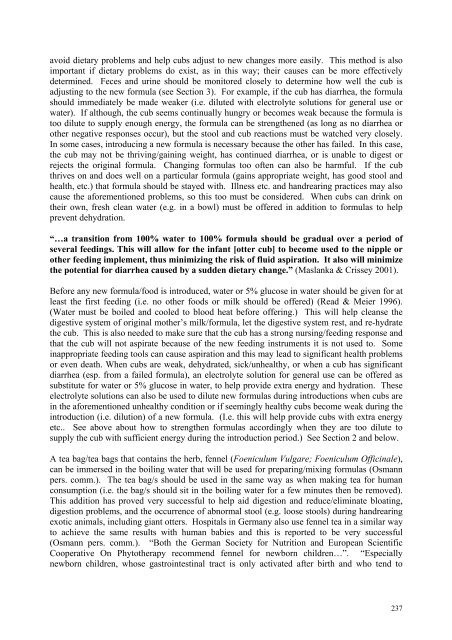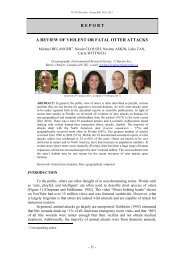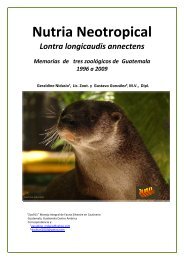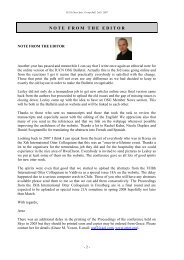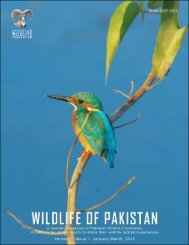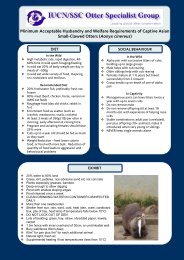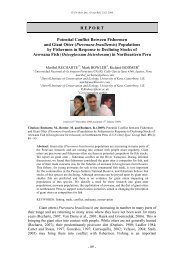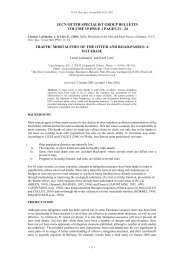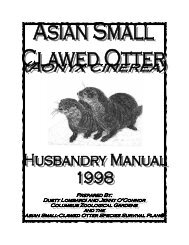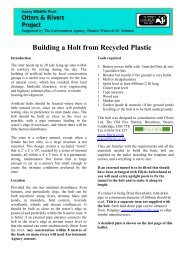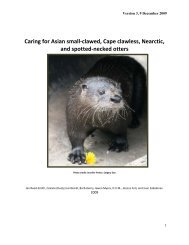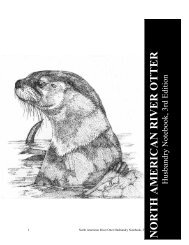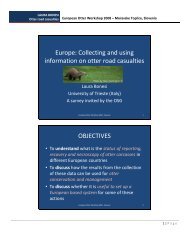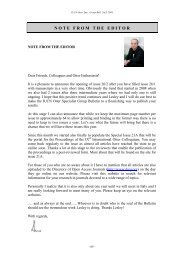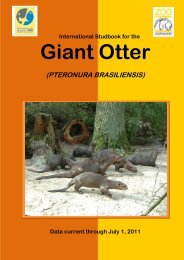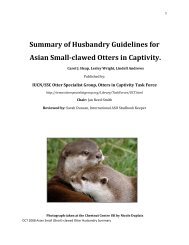International Giant Otter Studbook Husbandry and Management
International Giant Otter Studbook Husbandry and Management
International Giant Otter Studbook Husbandry and Management
You also want an ePaper? Increase the reach of your titles
YUMPU automatically turns print PDFs into web optimized ePapers that Google loves.
avoid dietary problems <strong>and</strong> help cubs adjust to new changes more easily. This method is also<br />
important if dietary problems do exist, as in this way; their causes can be more effectively<br />
determined. Feces <strong>and</strong> urine should be monitored closely to determine how well the cub is<br />
adjusting to the new formula (see Section 3). For example, if the cub has diarrhea, the formula<br />
should immediately be made weaker (i.e. diluted with electrolyte solutions for general use or<br />
water). If although, the cub seems continually hungry or becomes weak because the formula is<br />
too dilute to supply enough energy, the formula can be strengthened (as long as no diarrhea or<br />
other negative responses occur), but the stool <strong>and</strong> cub reactions must be watched very closely.<br />
In some cases, introducing a new formula is necessary because the other has failed. In this case,<br />
the cub may not be thriving/gaining weight, has continued diarrhea, or is unable to digest or<br />
rejects the original formula. Changing formulas too often can also be harmful. If the cub<br />
thrives on <strong>and</strong> does well on a particular formula (gains appropriate weight, has good stool <strong>and</strong><br />
health, etc.) that formula should be stayed with. Illness etc. <strong>and</strong> h<strong>and</strong>rearing practices may also<br />
cause the aforementioned problems, so this too must be considered. When cubs can drink on<br />
their own, fresh clean water (e.g. in a bowl) must be offered in addition to formulas to help<br />
prevent dehydration.<br />
“…a transition from 100% water to 100% formula should be gradual over a period of<br />
several feedings. This will allow for the infant [otter cub] to become used to the nipple or<br />
other feeding implement, thus minimizing the risk of fluid aspiration. It also will minimize<br />
the potential for diarrhea caused by a sudden dietary change.” (Maslanka & Crissey 2001).<br />
Before any new formula/food is introduced, water or 5% glucose in water should be given for at<br />
least the first feeding (i.e. no other foods or milk should be offered) (Read & Meier 1996).<br />
(Water must be boiled <strong>and</strong> cooled to blood heat before offering.) This will help cleanse the<br />
digestive system of original mother’s milk/formula, let the digestive system rest, <strong>and</strong> re-hydrate<br />
the cub. This is also needed to make sure that the cub has a strong nursing/feeding response <strong>and</strong><br />
that the cub will not aspirate because of the new feeding instruments it is not used to. Some<br />
inappropriate feeding tools can cause aspiration <strong>and</strong> this may lead to significant health problems<br />
or even death. When cubs are weak, dehydrated, sick/unhealthy, or when a cub has significant<br />
diarrhea (esp. from a failed formula), an electrolyte solution for general use can be offered as<br />
substitute for water or 5% glucose in water, to help provide extra energy <strong>and</strong> hydration. These<br />
electrolyte solutions can also be used to dilute new formulas during introductions when cubs are<br />
in the aforementioned unhealthy condition or if seemingly healthy cubs become weak during the<br />
introduction (i.e. dilution) of a new formula. (I.e. this will help provide cubs with extra energy<br />
etc.. See above about how to strengthen formulas accordingly when they are too dilute to<br />
supply the cub with sufficient energy during the introduction period.) See Section 2 <strong>and</strong> below.<br />
A tea bag/tea bags that contains the herb, fennel (Foeniculum Vulgare; Foeniculum Officinale),<br />
can be immersed in the boiling water that will be used for preparing/mixing formulas (Osmann<br />
pers. comm.). The tea bag/s should be used in the same way as when making tea for human<br />
consumption (i.e. the bag/s should sit in the boiling water for a few minutes then be removed).<br />
This addition has proved very successful to help aid digestion <strong>and</strong> reduce/eliminate bloating,<br />
digestion problems, <strong>and</strong> the occurrence of abnormal stool (e.g. loose stools) during h<strong>and</strong>rearing<br />
exotic animals, including giant otters. Hospitals in Germany also use fennel tea in a similar way<br />
to achieve the same results with human babies <strong>and</strong> this is reported to be very successful<br />
(Osmann pers. comm.). “Both the German Society for Nutrition <strong>and</strong> European Scientific<br />
Cooperative On Phytotherapy recommend fennel for newborn children…”. “Especially<br />
newborn children, whose gastrointestinal tract is only activated after birth <strong>and</strong> who tend to<br />
237


